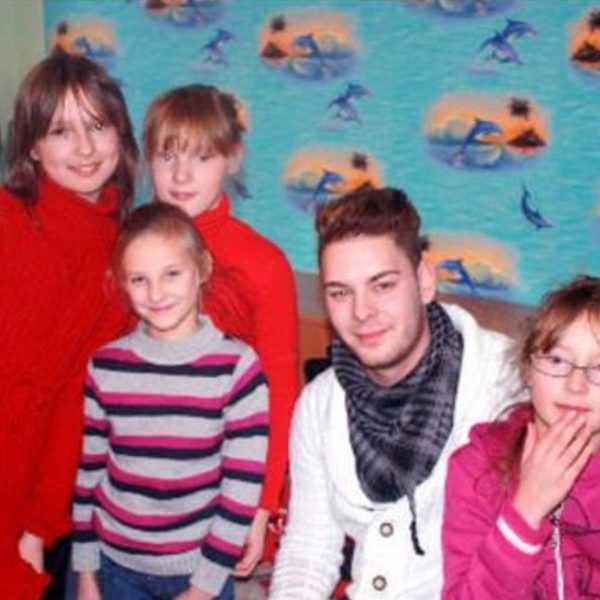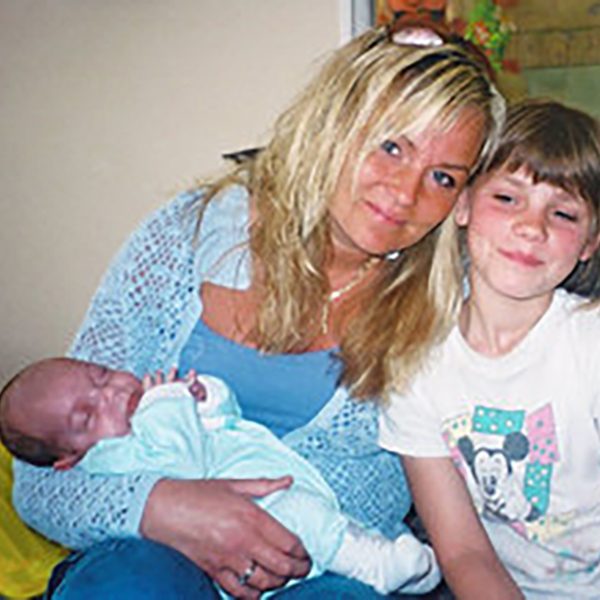
Over the years, many of Nikita Hair’s employees and managers have visited the Globos Namai orphanage in Lithuania.
Marius Enoksen is one of our talented managers who has been on a visit; and here is what he says:
“I was excited when I met Inger Ellen at the airport before we boarded a delayed flight to Lithuania where a two-hour drive awaited. It was dark by the time we reached Mazeikiai, the town where the orphanage is located, and it felt like we were driving into a ghost town. There were long distances between buildings and no street lights. When we finally arrived at the orphanage, we were warmly welcomed by Birute, “The Director” as they call her.
She was visibly happy that we had finally arrived.
Since it was so late, all the children had gone to bed, so after a simple evening meal in three languages with an interpreter, I went to bed with excitement, nervousness and anticipation of what awaited me the next day.
It was hard to go to sleep.
All I knew was that we were going to meet the children when I woke up.
All the children and adults were together when we entered the common room the following morning, clapping and smiling from ear to ear.
It was clear that they were happy that we had finally arrived! The hugs were loose, everyone got to greet us and we looked forward to being together, if only for a few days.
The days were so eventful and so full of impressions. The older children were given their own money to go to the market to buy winter clothes and warm shoes.
Winters are cold in Lithuania too.
We went together with the youngest children, and seeing the market hurt me, there were many people selling their personal belongings to afford the day’s meal.
We went on to visit Olivia, a girl Inger Ellen had met at the orphanage several years earlier who had found an apartment and managed to take care of her two children without much money.
We filled shopping trolleys with food, toys, medicines and other equipment we knew she needed, and were surprised to see her on the stairs.
The joy of reunion was great, and I was touched to see the gratitude and joy of what they received.
Our days with the kids were busy. We went skating, hiking, ate pizza and drank soft drinks. We shopped for toys and we played together. There was singing, dancing and days where sadness gave way to excitement and joy.
The foundation’s contribution to these children means more than we realize, and I am grateful to have helped give these children hope for a better future.
Knowing that we had ensured that all the children faced the winter with warm clothes, food, school equipment and teddy bears, we returned to Norway with both warmth and sadness in our hearts and tears in our eyes.
I’ll always be grateful for the experience and proud of our foundation, it warms my heart!

Sissel Moldjord, who has worked at Inger Ellen for a number of years, has also visited the orphanage.
Her visit ended up as an article in the local newspaper in Orkanger, outside Trondheim.
It reads:
Sissel Moldjord from Orkanger has seen heaven and hell.
In Lithuania.
She has seen children who have been given a second chance, new hope, a new life.
In the Globos Namai orphanage.
She has seen bottomless poverty and despair.
In the Lithuanian countryside.
A life as far removed from everyday Norwegian welfare life as it is possible to get.
She has captured images that have done something to her, that will live in her.
For a long time.
– Forever, says Sissel herself.
From Orkanger to Marzeiki
On a daily basis, she can be found as an active and committed leader of the Nikita department at the OTI Center.
Recently, she was able to take part in a journey of a lifetime.
Together with the hairdressing chain’s founder Inger Helen Nicolaisen and another employee of the hairdressing chain, she visited the Globus Namai orphanage outside Marzeiki in Lithuania.
For which Nikita is a sponsor.
“It’s a huge orphanage, with plenty of space to play.
Both inside and out.
65 young people live here.
The youngest is just two months old.
The oldest is 18.
65 young people with different backgrounds.
Some are orphans.
Some have simply abandoned their parents, others may have parents who are in prison, or parents who are no longer able to take care of their children.
– We came over late on a Friday night.
I thought the kids had gone to bed.
But, no, the kids were awake.
Very awake.
They were really looking forward to our visit and had arranged a big party for us – and woven flower wreaths for everyone. , says Sissel.
A kid in each hand
It was the start of an experience with many strong impressions, with a lot of joy, but also with tears and sadness.
– “It was my first time there, and it won’t be my last,” says Sissel emphatically, as she flips through the many photos she brought home from the trip.
Pictures of children and young people, with happy faces and big, open, searching eyes.
And in all the pictures, Sissel in the middle of the group of kids.
Because the kids were very interested in body contact.
Of closeness.
– Wherever I went or wherever I was, I had a kid in each hand, on my lap or in my arms.
Yes, even 16-year-old girls were just SO keen to hold my hands, she says.
Something the pictures confirm.
Happy children, young and old, clinging to Sissel.
And communication was no problem.
Even though not all of them could speak English, it went smoothly with warm glances, smiles, finger language and body contact.
–“They’re learning English at the orphanage, but not everyone has mastered it yet,” she says.
A lot of misery
The children at the orphanage have it great.
Good care, proper food and good teaching.
But not all of them have it so good.
Sissel & Co. went out with the child welfare services one day, and got to experience the misery in rural Lithuania at close quarters.
– It’s almost unbelievable.
Difficult to describe in words.
We were going to visit a family that child welfare services knew about.
The mother in the house was 29 years old and had ten children.
When we arrived, the parents were gone and had taken the three youngest children with them, probably terrified that CPS would take them away, she says.
The house was a case in itself, dilapidated and with a pervasive stench throughout the house.
Without electricity, of course.
And they had nothing, absolutely nothing to eat.
– We took the one girl who was at home to the nearest general store.
There she was able to buy all the food and other things she needed.
Afterwards, however, everything seemed a little empty.
We helped her and the rest of the family there and then.
But it’s only for a few days…
The Nikita trio also visited another family who lived in a tiny house with a kitchen garden outside.
Here, the children could barely afford to go to school, and everyone needed glasses.
And they got them.
Remaining faithful
Sissel also heard an older story where child welfare services visited a family.
They found the father half asleep and drunk.
Three girls were standing out in the yard when CPS arrived.
The youngest girl was gnawing on what was thought to be a loaf of bread – it was a dog bone.
Today, the siblings are at the orphanage and were able to tell Sissel and the others how sad and embarrassing they found it when the CPS came home and experienced the family in that way.
– Still.
It’s amazing how loyal kids are.
No matter how bad things have been for them, how they’ve been treated, how much they’ve been neglected.
Then they remain faithful to mother and father.
The misery is unimaginable, the contrasts violent.
In Lithuania, you’re either rich or you’re destitute.
– We only saw the poverty.
There is also a lot of drinking, a lot of alcohol.
Not least among the men.
And very many cases of neglect.
“Had to pamper a little…”
However, most of the time in Lithuania was spent with the children at the orphanage.
– Once we were there, we had to spoil them a bit.
Everyone got NOK 400 each to buy clothes at the market,” says Sissel, and tells us about quite a shopping spree.
– “Everything is so ridiculously cheap over there.
And can you imagine what everyone bought first?
Shoes.
Everyone had to have shoes, and everyone also came home with sunglasses.
And of course, there were some goodies too.
The funny thing is that these kids, who don’t have much at all, are very generous themselves.
As soon as they get something, they buy it.
Perhaps a little food for thought for those of us who live here in Norway, who live in abundance, and perhaps aren’t so good at sharing what we have.
Sissel also remembers well the trip to the swimming pool in Palanga.
– We also took the whole group on a trip, where many experienced swimming in a pool for the first time.
Did it matter if they couldn’t swim?
No, they just jumped in and stayed afloat using their arms and legs.
Just like dogs do. THEY had a great time.
And so did we, she adds.
Otherwise, great emphasis is placed on the fact that the children will one day move out of Globos Namai, and that they should therefore be taught to set goals and be able to take care of themselves.
Therefore, great emphasis is placed on the children completing their schooling and finding work, so that they can have an independent and good life.
We’ll be back
– What do you remember most from the trip?
– The faces.
I remember them all.
Open, happy and trusting.
It has stuck with me forever.
Just like the farewell day.
The tears that pressed on.
The kids who were almost inconsolable when we left.
But they know we’ll be back.
Your contribution helps make a difference in children’s lives. No one can help everyone, but everyone can help someone.